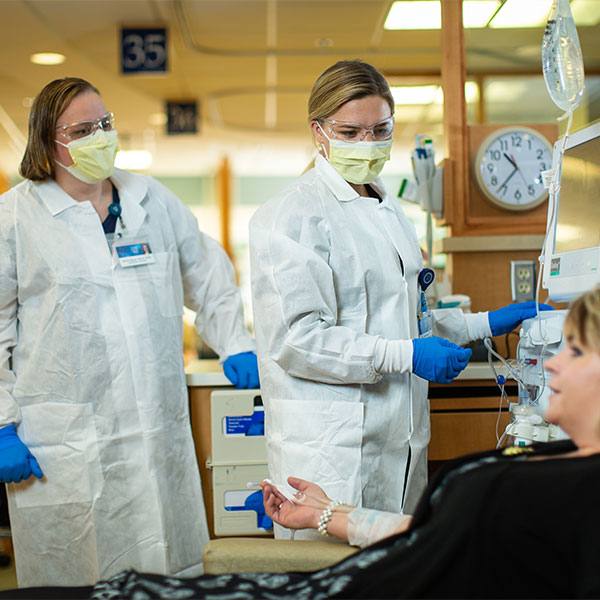-
Biotherapeutics
Unleashing the body’s ability to heal
"We are the patient's last, best hope," has been the motto of the Immune, Progenitor and Cell Therapeutics lab, also known as the IMPACT lab, at Mayo Clinic. This lab specializes in clinical and investigative use of cells as living drugs within the body to fight disease and initiate healing when standard therapies don't work.
With Allan Dietz, Ph.D., at the helm, the staff of the IMPACT lab has developed, validated and delivered investigative cell therapies to more than 800 patients in clinical trials at Mayo Clinic over the past 20 years.
"When we started, the search was on for new drugs to treat patients. In many cases, industry had reached a dead end with molecule-based drugs. Oftentimes, patients with complex disorders had no drug alternatives," says Dr. Dietz. "The underlying concept at the IMPACT lab is to tap the patient's own cells as natural healing mechanisms."
To further enhance the IMPACT lab's decadeslong success, it will transition from Mayo Clinic's Department of Laboratory Medicine and Pathology in March to become part of Mayo Clinic's Center for Regenerative Medicine. The lab will play a significant role in the new biomanufacturing strategy the center is leading to deliver new cures to the practice.
Dr. Dietz will join Center for Regenerative Medicine as senior director of Intake and Translational Research. In this new position, Dr. Dietz will work with the center's leaders to assess practice needs and advance regenerative technologies that show the most promise for patients.
Taking a risk
Mayo Clinic took a risk on an idea that Mayo should drive the development of a new class of living drugs at a time when the role of drug development and testing was unheard of at medical centers. Dr. Dietz credits emeritus Mayo Clinic leaders Dennis Gastineau, M.D.; Stanimir Vuk-Pavlovic, Ph.D.; and Franklyn Prendergast, M.D., Ph.D., for founding Mayo's vision for using cells as drugs to unleash the body's power to restore health. Dr. Dietz was hired as the lab's director to set this precursor to regenerative medicine in motion.
"There was grand skepticism on whether we could reproduce living drugs for patients with different indications. We had to teach ourselves everything — how to design the right trials, how to make products safely, how to administer them, how to dose them and even how to fund it," says Dr. Dietz. "Final determination of the value of this approach will await definitive clinical trials, but early studies show great promise. And the approach has been highly feasible. We've been able to provide investigative therapies for roughly 98% of patients enrolled in cellular therapy trials."
The IMPACT lab has evolved to provide investigative therapies for nearly all specialties at Mayo Clinic. It manufactures cell products for investigating challenging diseases with no therapeutic options, such as Lou Gehrig's disease, or amyotrophic lateral sclerosis; spinal cord injury; brain cancer; ovarian cancer; osteoarthritis of the knee and hip; and Crohn's disease.
Examples of cell therapies it manufactures are:
- Mesenchymal stem cells
These are adult stem cells with growth factors and healing potential. - Dendritic cells
These cells activate the immune system to target cancer. - Hematopoietic progenitor cells
These cells are derived from blood and bone marrow to treat blood cancers. - Chimeric antigen receptor-T cell therapy
This therapy involves immune cells that can be directed to target and kill tumor cells.
The safety record is high for the investigative cellular drugs the IMPACT lab manufactures. To date, no harmful side effects have been documented, and the lab has advanced six trials from phase 1 to phase 2 ― a substantially higher success rate than traditional drug development.
"I think cell therapies are much more powerful mechanisms than molecule-based drugs dispensed at the pharmacy," says Dr. Dietz. "Whether you get a cut or a broken bone, the body has a phenomenal ability to heal itself. When that process fails, the body doesn't know how to restart itself and it manifests itself in disease. What we've worked on in the IMPACT lab are ways to restart the body's healing process."
Remarkable achievements
The lMPACT lab has made significant contributions to advancing cellular therapies. In addition to the cells it manufactures, it supports another 30 clinical trials of products manufactured outside Mayo and delivers five commercial cell therapy products.
Results from the lab have contributed to patents, two biotech startups and more than 200 publications. It is one of the first labs in an academic medical center involved in contract manufacturing. At one time, the IMPACT lab held 40% of all the studies on mesenchymal stem cells in the U.S.
Dr. Dietz was part of a collaboration with colleagues in Surgery and Gastroenterology that earned a Mayo Clinic Team Science Award for developing a regenerative procedure for a painful condition known as perianal fistula. This condition generally does not respond to standard medical and surgical therapies. Fistulas are abnormal connections between the intestine and the skin, in this case the rectum and the perianal region.
This project has just begun to enroll patients for its phase 2 study, with the IMPACT lab acting as a centralized manufacturing site for seven other enrolling hospitals.
The field of cell therapy is still emerging, and the number of cell-based therapies approved for daily clinical care is fewer than a dozen. However, Dr. Dietz believes that number will rapidly increase over the coming years as investments from institutions like Mayo Clinic come to fruition and advance toward commercialization.
###








